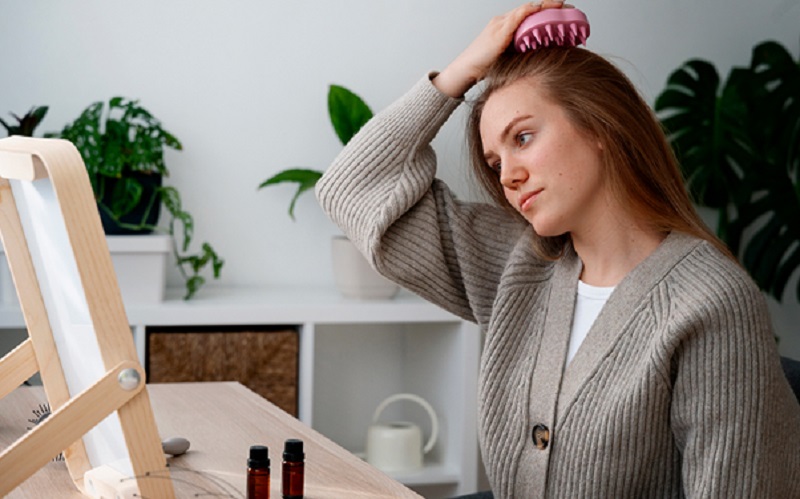A dry scalp is a skin condition that results in itchiness, flaking, dryness, and general discomfort. It differs from dandruff, which is often associated with oil buildup or fungal infections. Contributing factors may include cold weather, harsh shampoos, poor hydration, or skin conditions such as eczema. To treat it effectively, the focus should lie on restoring moisture, strengthening the scalp barrier, and supporting natural skin healing. Dry scalp treatment should always begin with identifying and reducing the factors that aggravate the skin.

Switch to Moisture-Retaining Cleansing Products
One key step in scalp therapy for dry scalp is the use of gentle cleansers that do not strip away the skin’s natural oils. Many conventional shampoos contain sulphates that worsen dryness. Selecting products with hydrating and soothing ingredients helps reduce irritation. Look for formulations that support skin balance, rather than offering aggressive cleaning. Washing less frequently can also help. While hygiene remains important, excessive washing can worsen dryness. Narrowing your washes two to three times may help the scalp recover.
Incorporate Scalp Oils into Weekly Care
Regular use of natural scalp oils is an effective method to restore skin moisture. Applying lightweight oils such as jojoba, coconut, or argan oil directly to the scalp can soothe inflammation and minimise flaking. These oils mimic the skin’s natural sebum, forming a protective barrier while also nourishing deeper layers of the scalp. Distribute the oil by massaging gently to boost healing and nutrient delivery. Letting the oil sit for an hour or overnight before washing enhances absorption.
Exfoliate with Care to Remove Flakes
Exfoliating the scalp once a week helps remove accumulated flakes and dead skin, allowing treatments to penetrate more effectively. However, care must be taken not to aggravate already-sensitive skin. Choose scalp scrubs with fine particles and calming ingredients. After exfoliation, always follow with a moisturising product or oil to replenish any lost hydration.
Improve Hydration from Within
External care can only go so far if the body lacks sufficient hydration. Drinking plenty of water daily plays a significant role in maintaining skin elasticity and moisture balance. Including omega-3 fatty acids in the diet—such as those found in oily fish, walnuts, and flaxseeds—can also support scalp health by improving the skin’s lipid layer. A well-balanced diet rich in vitamins A, D, and E supports overall skin function and may help reduce the frequency and severity of dry scalp flare-ups.
Maintain Scalp Protection Against Weather and Heat
Environmental factors like cold air and high heat can quickly worsen dry scalp. Wearing a hat in winter or using an umbrella on sunny days can reduce direct exposure. Indoors, using a humidifier can help maintain air moisture, especially during colder months when heaters dry out the environment. Avoiding direct heat from hairdryers is also important. Using low heat in blow-drying can minimise scalp damage if blow-drying is needed.
Learn More: Why Is My Scalp Itchy? Uncover The Causes and Find Your Treatment Solution!
Avoid Irritants and Harsh Treatments
Chemical treatments such as hair colouring or relaxers may intensify dryness and irritation. Reducing exposure to these treatments, or spacing them out with longer intervals, can give the scalp time to recover. If styling products like gels or sprays are regularly used, consider switching to alcohol-free versions. Alcohol is known to dehydrate the skin and can worsen existing dryness.
Monitor for Persistent or Underlying Conditions
If the dryness and flaking persist despite consistent care, it could be a sign of an underlying dermatological condition. Psoriasis, seborrheic dermatitis, and eczema are all possibilities. In these cases, professional consultation is recommended. A specialist can provide targeted treatments that address the root cause and prevent further irritation. Monitoring for symptoms such as redness, cracking, or spreading rashes can help determine when professional help is necessary. Early intervention often prevents conditions from worsening.
Keep a Regular Routine and Observe Results
Scalp therapy works best with consistency. Applying oils, using gentle products, and managing lifestyle habits regularly produce long-term improvements. Tracking progress over time helps identify what works and which habits need adjusting. Scalp health may not improve overnight, but a steady routine can lead to lasting relief from itchiness and flaking. Being patient with treatment and avoiding harsh interventions will result in better skin recovery.
For more information about products on dry scalp treatment, contact Bee Choo Origin today.


